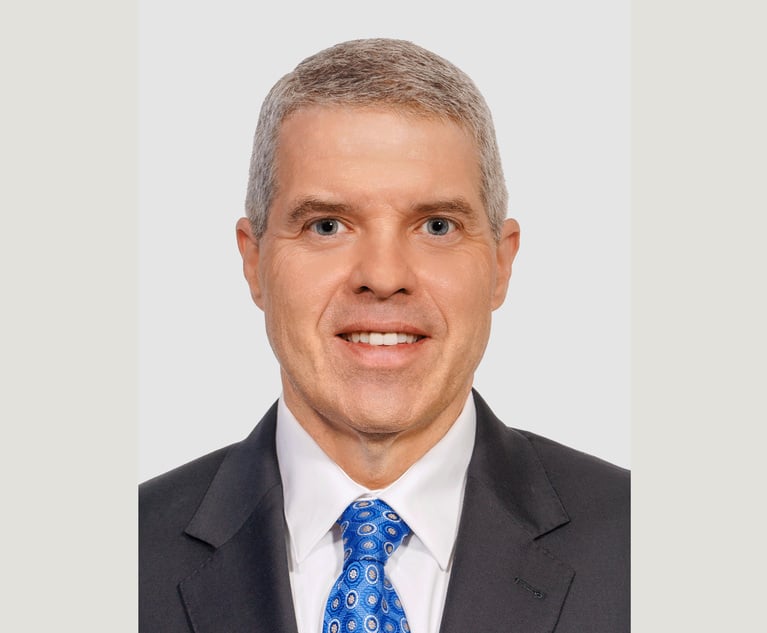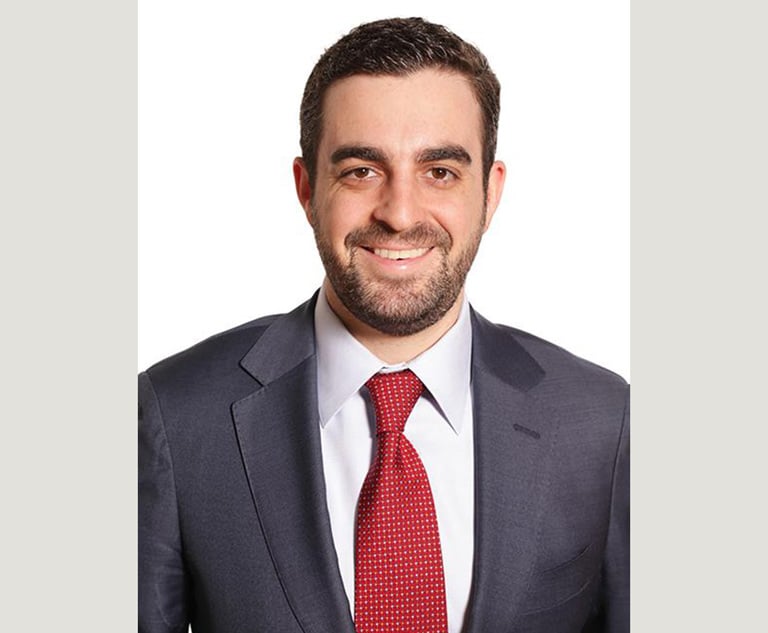 Temple University. (Photo: Shutterstock.com)
Temple University. (Photo: Shutterstock.com)O'Connor Tangled in Controversy Over Temple Prof's UN Speech
Patrick J. O'Connor, one of Cozen O'Connor's founders and the chairman of Temple's board of trustees, has drawn backlash for suggesting that a professor's job is in danger over his remarks last week.
December 03, 2018 at 03:27 PM
4 minute read
Cozen O'Connor's vice chairman has found himself in the spotlight again for statements made as a board member for Temple University, after he sharply criticized a Temple professor's speech before the United Nations about Israeli-Palestinian relations.
Patrick J. O'Connor, one of Cozen O'Connor's founders and chairman of Temple's board of trustees, drew backlash over the weekend from the Temple Association of University Professionals after suggesting that professor Marc Lamont Hill's status with the university might be in danger. O'Connor made those remarks in reaction to Hill's speech before the United Nations last week, in which he criticized Israel's treatment of Palestinians. O'Connor called the speech ”lamentable” and “disgusting,” according to The Philadelphia Inquirer.
“I'm not happy. The board's not happy. The administration's not happy. People wanted to fire him right away,” O'Connor said in an interview with The Inquirer on Nov. 30. “We're going to look at what remedies we have.”
Hill had also been a commentator for CNN, but the news network ended his contract after the U.N. speech Thursday. Some have called Hill's statements anti-Semitic, particularly his call for a “free Palestine from the river to the sea.” Hill has defended himself on social media, saying he supports Palestinian freedom but does not support anti-Semitism.
Temple University president Richard Englert made a statement Nov. 30 as well, in part highlighting the university's stance on religious and ethnic tolerance. “Temple condemns in the strongest possible terms all anti-Semitic, racist or incendiary language, hate speech, calls to violence, and the disparagement of any person or persons based on religion, nationality, race, gender, sexual orientation or identity,” the statement said.
Englert's statement also emphasized that “Professor Hill's right to express his opinion is protected by the Constitution to the same extent as any other private citizen.” But TAUP criticized university leadership for failing to note explicitly that Hill's comments are protected by “academic freedom,” as lined out in university professionals' contract with the school. And the union called O'Connor's statements to the Inquirer “unacceptable.”
“We are also deeply disturbed by chairman O'Connor's claim that the administration is looking at 'what remedies we have' to discipline professor Hill,” the union's statement said. “We trust that the contract will be followed; if it is not, the administration can count on a vigorous defense by TAUP of professor Hill's rights as set forth in it.”
It is not the first time O'Connor has drawn criticism from certain members of the Temple community. A group of students called for him to step down earlier this year because of his previous representation of Bill Cosby, who has since been convicted of aggravated indecent assault and sentenced to at three to 10 years in prison. O'Connor represented Cosby in 2005 and 2006, when former Temple University employee Andrea Constand, whose allegations led to Cosby's criminal charges and conviction, sued the comedian for sexually assaulting her in 2004.
In an October interview with The Temple News, a campus publication, O'Connor said he did not regret representing Cosby, despite criticism from some students. In 2005, Cosby and O'Connor were both members of the university's board of trustees.
“Trial lawyers, and the great trial tradition of Philadelphia lawyers, to represent people in unpopular causes … doesn't mean you embrace what the person was alleged to have done, it just means that in the great traditions of legal acumen lawyers serve their clients,” O'Connor told The Temple News.
O'Connor will step down as board chair in July, after 10 years in the role, the university announced in October. O'Connor did not return a call seeking comment Monday.
READ MORE:
This content has been archived. It is available through our partners, LexisNexis® and Bloomberg Law.
To view this content, please continue to their sites.
Not a Lexis Subscriber?
Subscribe Now
Not a Bloomberg Law Subscriber?
Subscribe Now
NOT FOR REPRINT
© 2024 ALM Global, LLC, All Rights Reserved. Request academic re-use from www.copyright.com. All other uses, submit a request to [email protected]. For more information visit Asset & Logo Licensing.
You Might Like
View All
The Defense Bar Is Feeling the Strain: Busy Med Mal Trial Schedules Might Be Phila.'s 'New Normal'
7 minute read
Jefferson Doctor Hit With $6.8M Verdict Over Death of 64-Year-Old Cancer Patient
3 minute read
Phila. Med Mal Lawyers In for Busy Year as Court Adjusts for Filing Boom
3 minute read
Phila. Jury Hits Sig Sauer With $11M Verdict Over Alleged Gun Defect
3 minute readTrending Stories
- 1The Pusillanimous Press
- 2Contract Lifecycle Management Company ContractPodAi Unveils Leah Drive
- 3'Great News' for Businesses? Judge Halts Transparency Mandate
- 4Consilio Announces ‘Native AI Review,’ Expanding Its Gen AI E-Discovery Offerings
- 5Federal Judge Hits US With $227,000 Sanction for Discovery Misconduct
Who Got The Work
Michael G. Bongiorno, Andrew Scott Dulberg and Elizabeth E. Driscoll from Wilmer Cutler Pickering Hale and Dorr have stepped in to represent Symbotic Inc., an A.I.-enabled technology platform that focuses on increasing supply chain efficiency, and other defendants in a pending shareholder derivative lawsuit. The case, filed Oct. 2 in Massachusetts District Court by the Brown Law Firm on behalf of Stephen Austen, accuses certain officers and directors of misleading investors in regard to Symbotic's potential for margin growth by failing to disclose that the company was not equipped to timely deploy its systems or manage expenses through project delays. The case, assigned to U.S. District Judge Nathaniel M. Gorton, is 1:24-cv-12522, Austen v. Cohen et al.
Who Got The Work
Edmund Polubinski and Marie Killmond of Davis Polk & Wardwell have entered appearances for data platform software development company MongoDB and other defendants in a pending shareholder derivative lawsuit. The action, filed Oct. 7 in New York Southern District Court by the Brown Law Firm, accuses the company's directors and/or officers of falsely expressing confidence in the company’s restructuring of its sales incentive plan and downplaying the severity of decreases in its upfront commitments. The case is 1:24-cv-07594, Roy v. Ittycheria et al.
Who Got The Work
Amy O. Bruchs and Kurt F. Ellison of Michael Best & Friedrich have entered appearances for Epic Systems Corp. in a pending employment discrimination lawsuit. The suit was filed Sept. 7 in Wisconsin Western District Court by Levine Eisberner LLC and Siri & Glimstad on behalf of a project manager who claims that he was wrongfully terminated after applying for a religious exemption to the defendant's COVID-19 vaccine mandate. The case, assigned to U.S. Magistrate Judge Anita Marie Boor, is 3:24-cv-00630, Secker, Nathan v. Epic Systems Corporation.
Who Got The Work
David X. Sullivan, Thomas J. Finn and Gregory A. Hall from McCarter & English have entered appearances for Sunrun Installation Services in a pending civil rights lawsuit. The complaint was filed Sept. 4 in Connecticut District Court by attorney Robert M. Berke on behalf of former employee George Edward Steins, who was arrested and charged with employing an unregistered home improvement salesperson. The complaint alleges that had Sunrun informed the Connecticut Department of Consumer Protection that the plaintiff's employment had ended in 2017 and that he no longer held Sunrun's home improvement contractor license, he would not have been hit with charges, which were dismissed in May 2024. The case, assigned to U.S. District Judge Jeffrey A. Meyer, is 3:24-cv-01423, Steins v. Sunrun, Inc. et al.
Who Got The Work
Greenberg Traurig shareholder Joshua L. Raskin has entered an appearance for boohoo.com UK Ltd. in a pending patent infringement lawsuit. The suit, filed Sept. 3 in Texas Eastern District Court by Rozier Hardt McDonough on behalf of Alto Dynamics, asserts five patents related to an online shopping platform. The case, assigned to U.S. District Judge Rodney Gilstrap, is 2:24-cv-00719, Alto Dynamics, LLC v. boohoo.com UK Limited.
Featured Firms
Law Offices of Gary Martin Hays & Associates, P.C.
(470) 294-1674
Law Offices of Mark E. Salomone
(857) 444-6468
Smith & Hassler
(713) 739-1250





